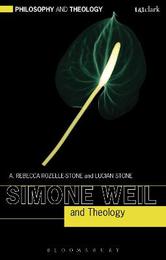
|
Simone Weil and Theology
Hardback
Main Details
| Title |
Simone Weil and Theology
|
| Authors and Contributors |
By (author) Professor A. Rebecca Rozelle-Stone
|
|
By (author) Professor Lucian Stone
|
| Series | Philosophy and Theology |
|---|
| Physical Properties |
| Format:Hardback | | Pages:192 | | Dimensions(mm): Height 216,Width 138 |
|
| Category/Genre | Philosophy of religion
Theology |
|---|
| ISBN/Barcode |
9780567537249
|
| Classifications | Dewey:200.1 |
|---|
| Audience | | Undergraduate | | Postgraduate, Research & Scholarly | |
|---|
|
Publishing Details |
| Publisher |
Bloomsbury Publishing PLC
|
| Imprint |
T.& T.Clark Ltd
|
| Publication Date |
28 March 2013 |
| Publication Country |
United Kingdom
|
Description
Simone Weil - philosopher, religious thinker, mystic, social/political activist - is notoriously difficult to categorize, since her life and writings challenge traditional academic boundaries. As many scholars have recognized, she set out few, if any, systematic theories, especially when it came to religious ideas. In this book, A. Rebecca Rozelle-Stone and Lucian Stone illuminate the ways in which Weil stands outside Western theological tradition by her use of paradox to resist the clamoring for greater degrees of certainty. Beyond a facile fallibilism, Simone Weil's ideas about the super-natural, love, Christianity, and spiritual action, and indeed, her seeming endorsement of a sort of atheism, detachment, foolishness, and passivity, begin to unravel old assumptions about what it is to encounter the divine.
Author Biography
Lucian Stone is Assistant Professor in the Department of Philosophy and Religion, The University of North Dakota, USA.
ReviewsRebecca Rozelle-Stone and Lucian Stone critically apply Simone Weil's "negative-reflective" theology to attitudes of modernity by grappling with the obscurities in her text. They explore her theories of attention as negative effort, creative action in "decreation", positive elements in affliction, essential ties between love and justice, plus her ambivalence toward Judaism. This presentation of her thought opens the reader to Simone Weil's conception of human life, as she believed it to be revealed in the Gospels. Extensive references to other major thinkers and personal insights into this French philosopher's thought make this work a provocative and valuable contribution to Weil studies. -- Dr. E. Jane Doering, Professor in the College of Arts and Letters, University of Notre Dame, USA This is an extended set of reflections that begin in Weil's claim that "the gospel contains a conception of human life and not a theology." In seriously engaging the post-modern, the authors draw out Weil's deep and subtle meditations on the human temptation to self-deception and on the possibilities of transformation in today's world. There are wonderful insights here on attention, beauty, grace and education that go to the real depth of Weil's thinking. These are things to be thought about carefully and for a long time. -- Eric O. Springsted, President of The American Weil Society Rebecca Rozelle-Stone and Lucian Stone have deftly bypassed the current sterile debates between militant atheists and simplistic Christian fundamentalists by engaging critically with the deep, paradoxical and sometimes disturbing writings of Simone Weil. Many postmodern themes such as the body, the erotic, and the gift are examined through the lens of Weil's understanding of the Gospels which do not contain a theology but manifest a "conception of human life." God or the good is like the sun, only to be understood by an examination of what is illuminated not by a direct gaze. Human goodness is not to be achieved by acts of the will but by attention and decreation. The authors set out to explain Weil's reasons for asserting this. Along the way, they develop an insightful critique of today's liberal, capitalist, therapeutic culture with its tendency to medicalize and psychologize every aspect of humanity. -- Larry Schmidt, Professor Emeritus of Religious Ethics, University of Toronto Two things need to be said in praise of this book and its ability to uncover Weil's depth, leaving a good deal of her cutting edge insights about human selves intact, and not muted ... This book fortunately keeps a strong sense of Weil's edge. But this is because, second, in talking about Weil's issues, it does so by itself engaging those issues in some wonderfully concrete, contemporary ways. The use of studies, contemporary philosophical literature, including feminist philosophy, and the illustrations used to support those points are all exceptionally to the point ... Not only a very good, and insightful book on Simone Weil's thinking, but a very good and wise book overall, that will bear close attention itself. -- Eric O. Springsted, The Center of Theological Inquiry * H-France Review *
|